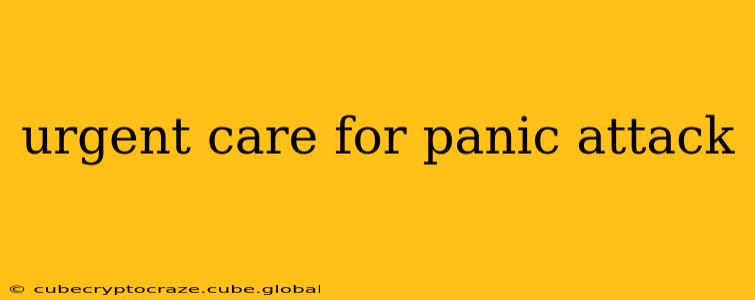Panic attacks can be terrifying experiences, leaving you feeling overwhelmed, breathless, and utterly out of control. While many people experience panic attacks and can manage them with self-help techniques, sometimes urgent care is necessary. This guide will help you understand when to seek immediate medical attention for a panic attack and what to expect when you arrive at urgent care.
What is a Panic Attack?
A panic attack is a sudden episode of intense fear that triggers an overwhelming physical response. Symptoms can include rapid heartbeat, shortness of breath, chest pain, dizziness, sweating, trembling, and feelings of impending doom. These symptoms can escalate quickly, creating a sense of intense anxiety and fear. While incredibly distressing, panic attacks are not life-threatening in themselves, but the symptoms can feel that way.
When Should I Go to Urgent Care for a Panic Attack?
Knowing when to seek urgent care for a panic attack is crucial. While self-care strategies can be effective for managing milder attacks, certain situations necessitate immediate medical attention:
1. First-time panic attack: If you've never experienced a panic attack before, it's essential to seek medical evaluation to rule out any underlying medical conditions that may be mimicking a panic attack. Your doctor can help differentiate between a panic attack and other medical emergencies like a heart attack or stroke.
2. Intense and prolonged attack: If your panic attack is exceptionally severe, lasts for an extended period (more than an hour), or leaves you feeling significantly debilitated afterward, urgent care is advisable.
3. Suicidal thoughts or self-harm: Panic attacks can sometimes be accompanied by intense feelings of despair and hopelessness. If you're experiencing suicidal thoughts or urges to self-harm, seek immediate help from urgent care or call emergency services.
4. Symptoms mimicking a heart attack: Some panic attack symptoms, such as chest pain and shortness of breath, can be similar to those of a heart attack. If you experience chest pain or pressure, particularly if accompanied by shortness of breath, sweating, or nausea, go to urgent care immediately. It's better to be safe than sorry.
5. Difficulty breathing: While shortness of breath is a common panic attack symptom, if you find it extremely difficult to catch your breath or feel like you're suffocating, seek immediate medical attention.
6. Loss of consciousness or fainting: If you lose consciousness or faint during a panic attack, this requires immediate medical intervention.
7. Uncontrollable shaking or tremors: While trembling is a common symptom, if the shaking is severe and uncontrollable, it warrants a medical evaluation.
What Happens at Urgent Care?
When you arrive at urgent care, the medical staff will likely assess your symptoms, take your vital signs (heart rate, blood pressure, etc.), and ask about your medical history. They might also conduct some basic tests to rule out other conditions. Depending on your individual needs and the severity of your situation, they may:
- Provide immediate support: They'll help you calm down and manage your symptoms. This may involve breathing techniques or medication to alleviate anxiety.
- Offer a preliminary diagnosis: They can help determine if your symptoms are consistent with a panic attack or if other medical conditions need to be investigated.
- Recommend a treatment plan: This might include therapy, medication, or a combination of both to help you manage future panic attacks.
- Refer you to a specialist: If necessary, they will likely refer you to a psychiatrist, psychologist, or other healthcare professional for ongoing care.
What are some self-care strategies for managing panic attacks?
While urgent care is crucial in certain situations, many individuals find relief from self-care techniques. These should not replace professional medical advice, but they can be helpful tools:
- Deep breathing exercises: Slow, deep breaths can help regulate your heart rate and reduce feelings of breathlessness.
- Grounding techniques: Focusing on your senses (what you see, hear, smell, touch, and taste) can help bring you back to the present moment.
- Progressive muscle relaxation: Systematically tensing and releasing different muscle groups can help reduce physical tension associated with anxiety.
- Mindfulness meditation: Practicing mindfulness can help you observe your thoughts and feelings without judgment.
Remember, seeking help is a sign of strength, not weakness. Don't hesitate to reach out for support if you're struggling with panic attacks. Urgent care can provide immediate relief and guidance, setting you on the path to better manage your anxiety.
